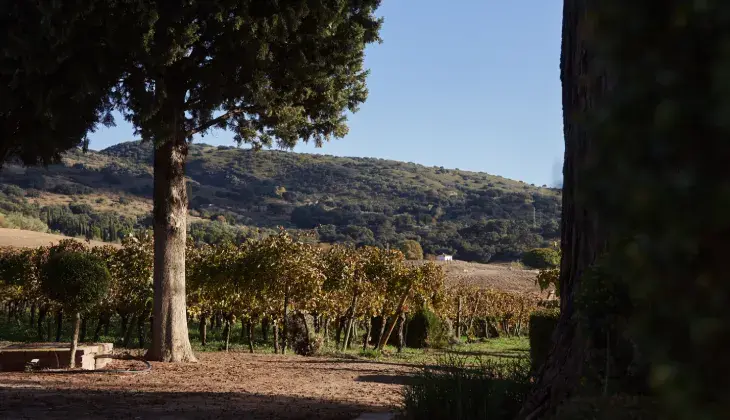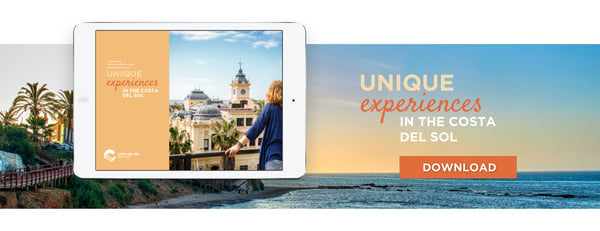The Serranía de Ronda is the perfect place to discover wine culture. A luxury destination unknown to many, where Federico Schatz arrived in 1982 with the idea of starting an organic and biodynamic vineyard in an area marked by history. A premium wine that this descendant of winemakers, his family has been making wine since 1641, managed to develop in the pleasant hills of the Ronda region. Wherever you look, the town that saw Phoenicians, Romans and Arabs amazes with impressive landscapes marked by the history of those who lived there. A rich heritage that others, after his feat, have followed to produce the best wines of the region in the most singular enclaves.
Although F. Schatz wineries are not the only ones in the area, they were the first to be planned, planted and produce wine in the mountains. Other projects such as La Melonera, Samsara Wines, El Cortijo Los Aguilares or the mystical Descalzos Viejos, make up this small sample of wine culture in Ronda.

The perfect climate for viticulture
Before setting up his vineyard in this town, Federico Schatz studied in detail the topography and climate of several parts of the world. As agreed with his father, he intended to set up his vineyard in a place not too far from Germany in order to remain close to his family. After long research, he found out, to his surprise, that the area of Ronda had ideal features. A Mediterranean climate with warm days and cold nights, the altitude to receive winds from the Atlantic Ocean, and a fertile land where numerous vineyards had produced good wines in the past before the plague of phylloxera, a tiny insect that damages the vine plant and affected Europe in the 1870s. The area, which at the time had many local varieties of grapes, was empty of vineyards, something that changed with his careful intervention.

Unique experiences in the organic vineyard
Wine culture offers unique experiences in the many vineyards and wineries that are distributed throughout the Serranía. However, it is not the only area in Málaga, since the province is renowned for its sweet wines, with small family producers distributed all over La Axarquía. Like Federico, other people felt trapped by the idea of producing good wine, by the overwhelming and spectacular natural landscape, the good climate and the objective of planting vineyards from scratch in this fertile region. Federico Schatz had access to "heritage vines", the first lands that allowed the cultivation of grapes for winemaking through an inherited historical right. This type of soil was scarce in the area, although winemaking tradition in Ronda goes back to the Roman presence in the nearby ancient town of Acinipo, which precisely gives its name to one of the wines of his winery.
If something surprises when visiting this temple of organic wine of just three hectares, it is the well-kept garden that houses a baby sequoia, or the intelligent use of different shrubs, such as myrtle, to attract or avoid the invasion of insects. Everything is painstakingly considered to produce some 15,000 bottles of the most exquisite organic wine, produced with the natural power of biodynamics. Half of the production travels out of our borders every season. A fact that clearly reflects the impact that his small production wines have in the most select palates.

Oenology from the ground up
Ana de Castro is the oenologist at La Melonera. She arrived in Ronda in 2007 with a key objective, to recover some of the more than 147 native Andalusian grape varieties that grew in this area before the phylloxera plague. La Melonera is one of these varieties, a melon-shaped grape, which today makes up the wines produced in this winery. A research process involving the University of Lima in Peru, after finding interesting information in the Archivo de Indias in Seville regarding the content of the loads in ships heading to the New World. Ana learned in the documents that the long journey made the wine sour, so that at one point the ships that were sailing to Latin America began carrying some grape varieties to plant vineyards in the area. This historical fact made possible to rescue some varieties such as the Melonera, which gives its name to the winery, doradilla, tintina or rompetinajas, which they make their wines with. This ambitious project led them to create the vineyard from scratch, studying in each harvest quantity, quality, and best method to work with these varieties.

Wine cellars with charm
Both pioneer Federico Schatz and oenologist Ana de Castro share their love for wine with Bibi García at Los Aguilares and Pablo Chacón at Samsara, other wineries in the area that also started almost from scratch and that today offer the best wines, wine tastings and exclusive events. In addition to these, with a bigger wine production, Descalzos Viejos appears like an oasis in the middle of the mountains. Paco Retamero and Flavio Salesi manage the winery, located in a XVI century Trinitarian convent, where the old refectory now houses the bodega, displaying an unusual decoration: fresco paintings of Saint Justa and Saint Rufina were found on its walls behind several layers of limewash. A mystical place with a limited wine production, shared in harmony with an architecture studio. Descalzos Viejos is a magical place linked to the history of the mountains, full of adventures of bandoleros, with nooks and places to lose yourself through the senses. The smallest of productions with the most artisanal methods to get a few bottles from each harvest since 2003. They rely on quality and combine fermentation in barrels and steel tanks. The 7 hectares that make up the estate get the best out of the Cabernet Sauvignon, Syrah, Garnacha, Graciano, Petit Verdot, Merlot and Chardonnay varieties.
Wine culture with local varieties
The rescue of grape varieties such as doradilla, rompetinajas or tintina is the objective of La Melonera, one of the most innovative wineries in search of the roots, flavours and smells that surrounded the mountains of Andalucía centuries ago. An enthusiastic search with a slow, meticulous and precise development in which care for the details and love for the vineyard mark its production. White, rosé and red wines are distributed around the world, taking advantage of nature’s wisdom and technology advances. 'Payoya Negra' is one of its references, a tribute to the native goats of the mountains.

The great wines of Ronda
The quality of its wines is one of the reasons to choose Ronda as a luxury destination. Award-winning varieties such as Pinot Noir from Cortijo Los Aguilares, or the interesting bet of La Melonera with 'Yo Solo', a wine elaborated with different local varieties and different methods every year, so each vintage allows more knowledge about the possibilities of the grape. F. Schatz wines are produced following a deep-rooted process, in which vineyards are protected by pest-preventing native plants. Vineyards are within a natural ecosystem, growing in only three hectares of land. Botanical typologies belonging to the area’s biodiversity contribute to the whole process of organic winemaking. 'DV Aires' is one of Descalzos Viejos’ labels, elaborated with Petit Verdot and Garnacha, a mineral wine thanks to the contribution of the soil, with a high presence of limestone.

Wine culture: decanting in the middle of nature
The region of Ronda is not only focused on wine production, although it is undoubtedly one of the great protagonists. The tajo, an Andalusian word for a deep cut, divides the city into a great cliff where Guadalevín River flows. Spectacular views from any point of the city, which also extends to its mountains, home to the payoya goat great cheeses, and the Malaga young goat, one of the delicacies of the area.
A journey to the history of the serranía of Ronda
Ronda is in one of the most impressive landscapes in Andalusia, halfway between Sierra de las Nieves and Cazorla, both Biosphere Reserves. A spectacular area populated by millennial trees which remain untouched in the process of planting the vines, giving its name to one of La Melonera’s wines, "La encina del inglés" (The Englishman’s oak), as a reference to the custom of the travellers who made those rugged routes and rested under the shade of one of these native oaks. At Cortijo Los Aguilares vineyards are also planted surrounding these trees, taking advantage of the shade underneath to hold wine tastings in these unique spots in the mountains.
These steep paths are still travelled through today by donkeys, an old way of transporting products from the coast to this town, one of the most important walled towns in the area, and to other points of the province. Rural carriers called arrieros guided poets, artists and travellers discovering the beauty of the area, walking round those narrow paths that served as a previous form of roads. Rural spaces that are still alive thanks to a controlled urban development in which the power of nature does not give an inch. A magical place full of history inviting the visitor to discover curiosities, details and anecdotes of the culture of the region.

Wines that taste like soil, forest and grass
Right in front of the Tajo, one of the most photographed spots in Ronda; this is where Samsara Wines is located, the second generation of winemakers deep-rooted in the land. A small and honest production that works in full harmony with its environment. Paco Chacón manages this small winery that offers, without a doubt, the best views of the legendary town of Ronda, in one of the most photographed spots in the province. Their wines collect all the essence of the area taking advantage of the stony and calcareous soil, the humidity and proximity to the Mediterranean forest, belonging to the D.O. Sierras de Málaga.

Enjoy the best pairing with wine culture
Ronda as luxury destination offers much more than a visit to a wine culture deeply rooted in these lands thanks to different grape varieties and ancestral techniques, intended for exquisite palates. The town also houses one of the most interesting restaurants in the province of Malaga, Benito Gómez’s Bardal, a two Michelin-star restaurant where the wines of the region are paired with the most select dishes, a bet for honest and unpretentious cuisine. Gourmet cuisine in an area full of attractions for wine, good food and history lovers in a dream landscape.

Many reasons to choose Ronda
Ronda is an Andalusian and Roman town, cosmopolitan and rooted to the soil, incorporating with ease the best haute cuisine restaurants in its streets and squares, and at the same time keeping alive the roots of the arrieros with their donkeys or the stories of bandoleros, who assaulted the diligences taking advantage of the topography of the area. Spectacular miradores to enjoy the view, exclusive activities and events mixing the history of one of the richest regions of the province of Malaga with the Costa del Sol. An area in continuous evolution, which maintains a rural charm and is proud of a rich natural landscape located in a perfect spot, where centuries of history have passed through. A history that the area wineries help discover, protect and value to give meaning to this privileged destination in southern Europe.








